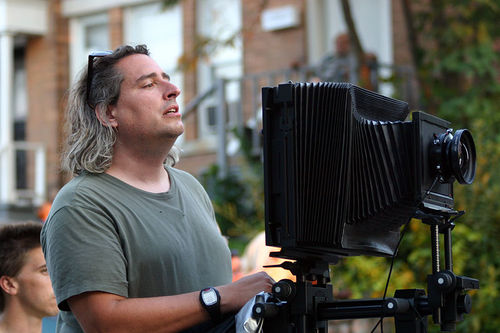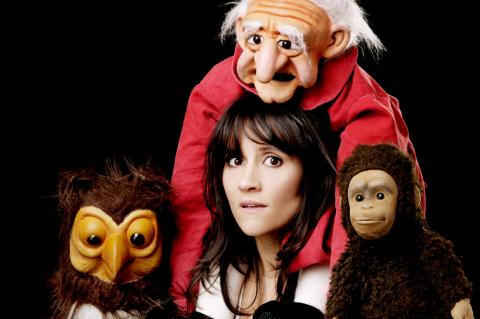 Back to selection
Back to selection
A QUICK SAIL THROUGH THE 21ST ANNUAL WOODS HOLE FILM FESTIVAL

 Two days is not nearly enough time to cover the Woods Hole Film Festival, which started as a “one day, one hour” event over two decades ago, and now for eight days takes over this tiny idyllic town on the Cape, otherwise known for its world famous Oceanographic Institution, and where the moneyed can catch a ferry to Martha’s Vineyard. Luckily, I used my 48 hours wisely, hopping from venue to quaint venue – including the Lillie Auditorium at the Marine Biological Laboratory, the 120-seat Woods Hole Community Hall, and the 70-seat Old Woods Hole Fire Station – and taking in more solid films (especially docs) than clunkers. Not to mention rediscovering one genuine surprise that served to remind me of the timeless power of the moving image.
Two days is not nearly enough time to cover the Woods Hole Film Festival, which started as a “one day, one hour” event over two decades ago, and now for eight days takes over this tiny idyllic town on the Cape, otherwise known for its world famous Oceanographic Institution, and where the moneyed can catch a ferry to Martha’s Vineyard. Luckily, I used my 48 hours wisely, hopping from venue to quaint venue – including the Lillie Auditorium at the Marine Biological Laboratory, the 120-seat Woods Hole Community Hall, and the 70-seat Old Woods Hole Fire Station – and taking in more solid films (especially docs) than clunkers. Not to mention rediscovering one genuine surprise that served to remind me of the timeless power of the moving image.
Though the WHFF is a local, nonprofit, shoestring-budget endeavor, it does have the good fortune of being able to tap into New England’s long tradition of birthing quality nonfiction flicks. Also, the Massachusetts angle was worked with great aplomb when it came to programming films like Ben Shapiro’s Gregory Crewdson: Brief Encounters (above), a portrait of the David Lynch of photography that manages to balance its many talking heads in front of the lens with actual artistry behind it. (Until his recent Cinecittà-set series, Park Slope-bred Crewdson had never staged his grand tableaux outside Massachusetts.) The same could be said of Luke Poling and Tom Bean’s Best Documentary Feature-nabbing Plimpton! Starring George Plimpton as Himself, a thorough look at a much different auteur, whose fearless life was his artwork – and whose family at one time owned most of Walpole – delightfully infused with the subject’s own mischievous sense of humor.

I was also excited to note several top-notch selections that I’d seen at prior fests, including Emily Lou’s haunted house comedy The Selling (which is currently soliciting funds for a theatrical release at the Filmmaker Kickstarter page), and Nina Conti’s Her Master’s Voice, a truly one-of-a-kind gem. Executive produced by Christopher Guest, Conti’s doc follows the director, an acclaimed ventriloquist herself, on her journey to Vent Haven, an eerie museum/final resting place for puppets of dead ventriloquists. With a sidekick named Monkey, and with a hilarious lighthearted narcissism reminiscent of Ross McElwee in Sherman’s March, Conti takes us on a psychological trip as well, as she travels across the pond to make a donation from the collection of Ken Campbell, her mentor and lover, and a legend in Britain’s experimental theatre world.
In fact, only a few films left me feeling disappointed. Unfortunately, one was from Boston homeboy Matt Ruskin, whose SXSW-premiering, Seymour Cassel-featuring Booster, which took Best Narrative Feature, I had high hopes for. Wearing its 70s influences a bit too obviously on its gritty indie sleeve, the acting is the most exciting thing about this too slow-moving tale of a Boston shoplifter turned armed robber. (Which is odd, considering that its lead, Nico Stone, who smolders like a young Ray Liotta, is a non-actor and childhood friend of the director.) Too bad Ruskin didn’t team up with Laura Colella – who studied at Harvard under Raúl Ruiz yet seems more influenced by Wes Anderson or Alexander Payne – and whose Breakfast with Curtis, though cringe-worthy cutesy in spots, boasts very assured directing and a refreshingly smart script. I just wish she’d held out for a cast worthy of her talent. (The lead role of an eccentric bookseller who befriends the near-autistic nerd next door practically screams to be played by Bill Murray or Paul Giamatti.)
But as problematic as these fiction films may have been, at least they reveled in real-life ambiguities, which was not the case with Kum-Kum Bhavnani’s nonfiction feature Nothing Like Chocolate. Narrated by Susan Sarandon (who, along with her ex-partner Tim Robbins, is the go-to preacher for smug, left-wing, activist doc-making) the film follows a white anarchist from Oregon who moves to Grenada to set up a chocolate company, hoping to rid the world of child slave labor at the hands of The Man (along with Hershey’s kisses). Alas, that feature’s ostensible hero could have learned a thing or two about economic disenfranchisement from my favorite film of the fest. A pic crafted nearly a century ago, the silent, 1920-version of The Mark of Zorro – which was screened with live, Brazilian-tinged musical accompaniment courtesy of The Zeds (a group made up of musicians from MIT) – ended in a standing ovation from the entranced crowd. Starring the forever charismatic and unbelievably acrobatic Douglas Fairbanks, Fred Niblo’s energetic swashbuckler adventure about a masked swordsman who saves the oppressed (and wins the Lolita) still packs a punch, and moves with the lightning speed of the Internet age. Though Caucasians playing hombres might be politically incorrect nowadays, The Mark of Zorro manages to never feel condescending, its Robin Hood tale, like Shakespeare’s plays, always in universal style.
